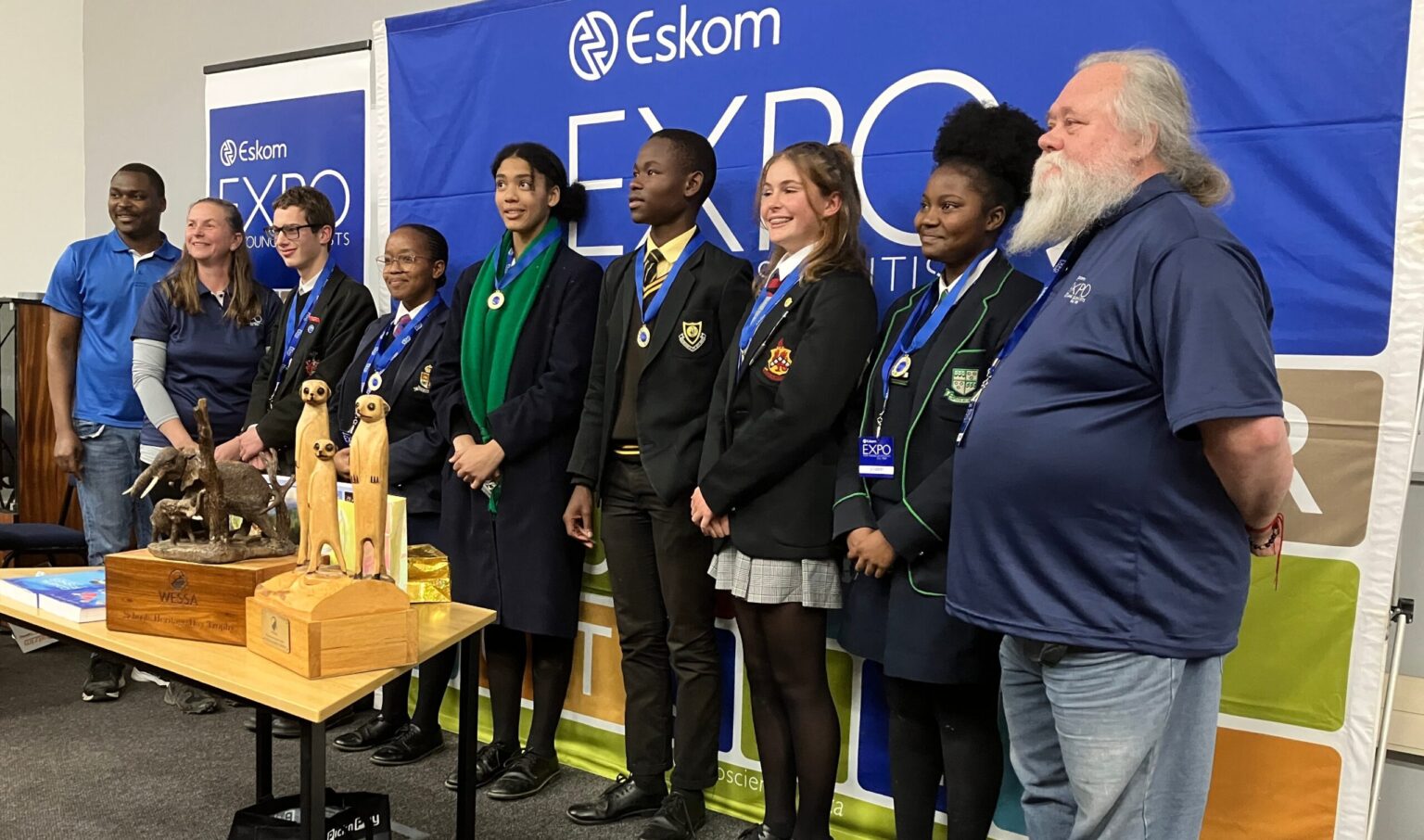By Steven Lang
The hard work they put in over the last few weeks paid off big time at the Eskom Expo for Young Scientists in the Makhanda Regional finals on Saturday. Six pupils in grades nine to 11 won gold medals in the fiercely contested science competition. Eight projects received silver medals, and 14 were awarded bronze medals.
A lot of preparation went into making the day a success. Some pupils had been working on their projects for weeks – painstakingly recording their observations, writing out methodologies, re-writing results and taking into account their teacher’s guidance. It is certain that many young people were working till late the night before.
Projects were allocated the following categories:
- Computer Science, Physics and Maths
- Environmental Studies and Plant Sciences
- Agricultural and Animal
- Engineering
- Social Sciences
- Ethics
- Biomedical and Chemistry
- Earth Sciences and Energy
Gold medallists scored over 80% for their projects:
| Pupil Name | Project title | School |
| Dinisa Buhle | Does nutritional value have an influence on the density of fruit and vegetables? | Port Alfred High School |
| Conré Henning | Emergency Rescue Bot | PJ Olivier |
| Mairi van Schoor | The relationship between shape and sound | Victoria Girls High School |
| Alutha Botha | Exploring habitat use by juvenile fishes in Algoa Bay through remote underwater videos | Nombulelo Secondary School |
| Rutendo Chakona | Detecting fish species using environmental DNA | Victoria Girls High School |
| Savanna Renaud | Of mice and music | Kingswood College |
Table 1: Gold medallists scored over 80% for their projects
The marking system for the projects is very strict. At least two teams of judges have to examine each project, and then a convenor must ensure that teams with different marks reach a consensus on an appropriate final mark. The marks then have to pass the scrutiny of a moderator and the chief judge, Leo Goosen, before any awards can be made.
Silver medals were awarded to projects that scored between 70 and 70%. There were two silvers each for Victoria Girls High School and Funda High from Whittlesea, and one each from Bulelani Senior Secondary School in Komani, Ntaba Maria, Kingswood College and Graeme College.
Projects that scored from 60 to 69% received bronze medals. Oatlands Preparatory School, Kingswood College and Victoria Girls High School received three each; Hoërskool Hangklip won two; while Ntaba Maria, Funda High and Ntsika Senior Secondary were awarded one bronze medal each.
Rhodes University contributed three of the most valuable prizes to gold medallists: Savanna Renaud, Rutendo Chakona and Alutha Botha. They were awarded a year’s free tuition in the Faculty of Science – a prize said to be worth about R60,000 each.
There were a number of special awards, including trophies and books from the Wildlife and Environment Society of South Africa (WESSA), R5,000 worth of technical equipment from RS South Africa and books donated by the South African Institute for Aquatic Biodiversity (SAIAB).
Altogether 79 projects were on display at the Great Hall on Rhodes University Campus.
Some of the pupils who lived far from town had to wake up at 3:00 am to make the bus ride and arrive on time in a cold, blustery Makhanda. As soon as the bus parked, they had to hurry to set up their projects in time to face the first judges.
In view of the logistical challenges of getting to Makhanda, it is not surprising that local schools had a far higher representation.
Number of projects per school:
| No. | Name of School | Town |
| 17 | Kingswood College | Makhanda |
| 16 | Victoria Girls High School | Makhanda |
| 9 | Ntaba Maria | Makhanda |
| 8 | Sixishe Junior Secondary School | Komani |
| 7 | Bulelani Senior Secondary School | Komani (Queenstown) |
| 6 | Oatlands Preparatory School | Makhanda |
| 5 | Funda High | Whittlesea |
| 3 | Ntsika Secondary School | Makhanda |
| 2 | Get Ahead College | Komani |
| 2 | Hoërskool Hangklip | Komani |
| 2 | Nombulelo Secondary School | Makhanda |
| 1 | Port Alfred High School | Port Alfred |
| 1 | PJ Olivier | Makhanda |
The winners of the regional finals, held in various parts of the country, will participate in the national finals in Gauteng later this year. The national winners will then have the opportunity to compete in an international competition.


